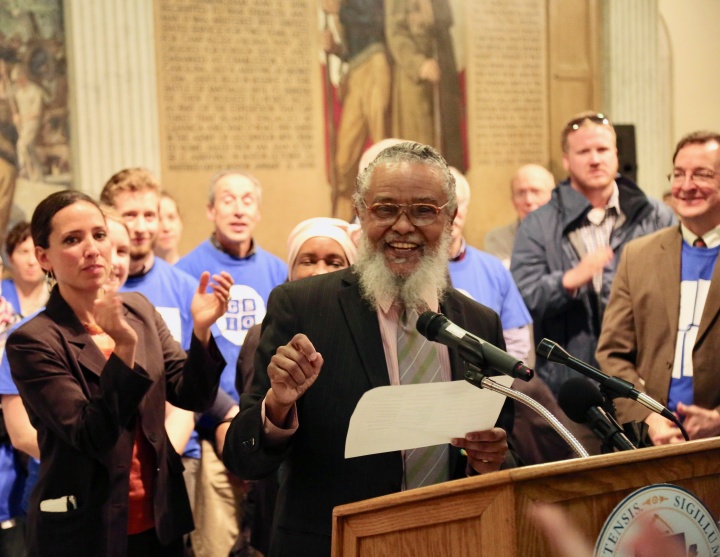
LAWMAKERS GATHERED OUTSIDE the House chamber Tuesday to declare their commitment to wide-ranging criminal justice reforms, further evidence of a push on Beacon Hill for changes that go beyond a consensus bill rolled out by Gov. Charlie Baker in February.
“We are all here united today because we believe that this session is an opportunity for comprehensive criminal justice reform,” said Rep. Byron Rushing, the House assistant majority leader.
In February, Baker unveiled legislation that was the culmination of more than a year of work by the nonpartisan Council of State Governments, whose policy experts were invited by state leaders to help craft a plan to address criminal justice reform issues.

Critics have said the bill is limited because it only focuses on prisoner release and reentry into the community, ignoring big issues related to sentencing policy, bail practices, and other factors that determine who gets incarcerated and for how long. The Baker legislation would beef up services for inmates being released, and it would more inmates, including some of those serving mandatory minimum drug sentences, to earn “good time” credits that reduce their sentence by taking part in prison programming. The bill has the support of House Speaker Robert DeLeo, Senate President Stan Rosenberg, and Supreme Judicial Court Chief Justice Ralph Gants.
However, Rosenberg and Gants have both voiced support for reforms that go beyond the bill. DeLeo and Baker have held back any commitment to further measures. DeLeo, in particular, will be the crucial player going forward, given the Democratic super-majorities in both legislative branches.
About a dozen House members were joined at Tuesday’s event by Sen. Sonia Chang-Diaz. They represented four Beacon Hill legislative caucuses: the Black and Latino Legislative Caucus; the House Progressive Caucus; the Caucus of Women Legislators; and the Harm Reduction and Drug Law Reform Caucus.

Gathered in support of the legislators were activists with several organizations backing criminal justice reform, including the Greater Boston Interfaith Organization and the Massachusetts Communities Action Network.
The lawmakers say they support a broad set of reforms, including elimination of mandatory minimum sentences for some drug offences, bail reform, and a commitment to more services to inmates while they are behind bars. They also said the state needs to collect better data on race and ethnicity in the criminal justice system.
“Decades of racially biased sentencing policies have had an overwhelming and irrefutable impact on the communities that we represent,” said Chang-Diaz, a Democrat from Jamaica Plain.
She said blacks and Latinos make up less than one-fifth of the state population, but account for more than half of those incarcerated. She said they account for about half of those convicted of drug crimes that don’t carry mandatory minimum sentences, but 75 percent of those convicted of drug crimes with mandatory minimums.
“Justice, we can all agree, should be colorblind, but today there is no denying the complexion of incarceration in our state,” she said.
Chang-Diaz said it is imperative to look at sentencing issues and not just policies affecting those in prison or being released. “Sentencing policy defines the system, and it determines much of the human and financial cost for every subsequent phase of the system,” she said.
